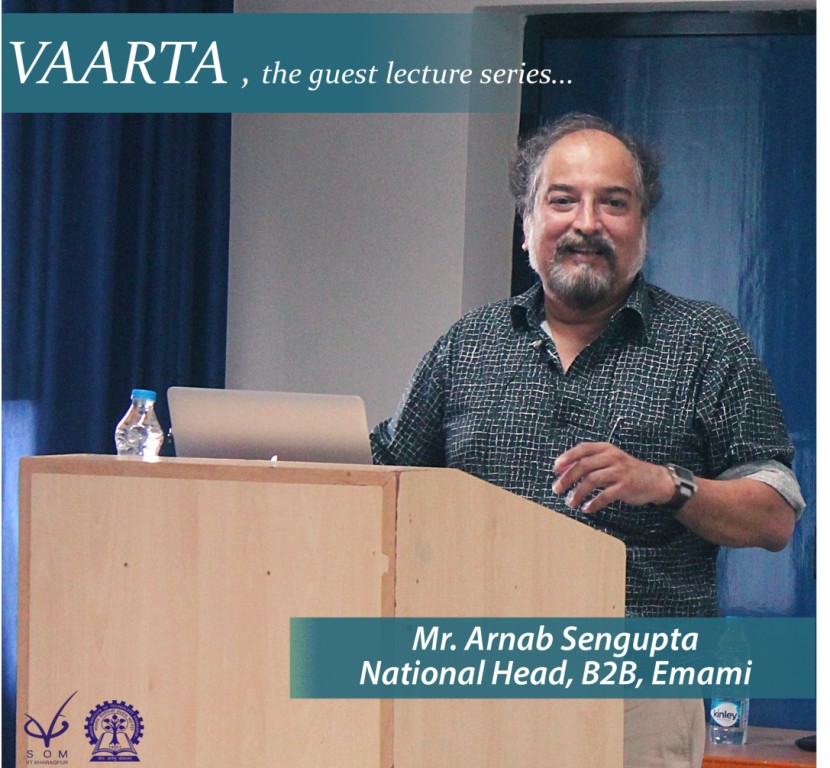"India is the cradle of the human race, the birthplace of human speech, the mother of history, the grandmother of legend, and the great grandmother of tradition. Our most valuable and most instructive materials in the history of man are treasured up in India only." - Mark Twain
India, the epitome of diversity is always hailed by the world to be the next powerhouse in the world arena. But so many impediments always hinder its growth and deter India from unleashing its full potential. Lagging behind in manufacturing & nurturing its own resources is one of major deterrents. ‘Make in India’ is one of the initiatives, taken by the recent government which has the potential to address this issue.
On the 5th of September, VGSoM had the privilege to welcome Mr. Arnab Sengupta, National head-modern trade, B2B & Business Development, EmamiAgrotech Ltd. for guest lecture session on the topic ‘Made in India’. Mr. Sengupta is an IIM Lucknow alumnus and a noted name in the scene of commercial business development & marketing among other areas of specialization. Apart from his current role, he has also had prior management experience at ITC, Cavinkare Pvt Ltd, ABP Group and India Today group.
Mr. Sengupta introduced the topic by differentiating between ‘Make in India’ & ‘Made in India’. Seeking inputs from the audience Mr. Sengupta explained why India needs to switch to the ‘Made in India’ concept and also in the meantime embark on skill development. During the interaction, he also enquired whether anyone among the audience was using an Indian cell-phone or laptop brand. With no hands going up in the air it portrayed to us the true picture that we are dawdling behind in delivering quality products which can compete with globally acknowledged brands.

Structuring the discussion around the global brands, Mr. Sengupta did not shy away from mentioning IITs as one of India’s global brands. He impressed upon the fact that we always had all the resources but didn’t utilize it in an efficient manner. Mr. Sengupta also reminded us about the brain-drain happening in India. We import a lot of goods & services rather than marketing our own goods like Assam tea, basmati rice and the list goes on. Mr. Sengupta also cited an example pertaining to his journey from Howrah station to Kharagpur where he saw big hoardings of KFC & Pizza hut at station but nowhere he could find any Indian brand being displayed. On a lighter note Mr. Sengupta said ‘we all eat noodles, when will the world eat idlis... ’.Going forward Mr. Sengupta also talked about countries like Indonesia, Thailand which were having nothing noteworthy but made it big. He also cited the example of Japan which recovered tremendously and is currently one of powerhouses of the world.
Mr. Sengupta then addressed questions from the students mainly focused on start-up ecosystem, entrepreneurship hurdles in India, India’s economic growth etc. Mr. Sengupta also encouraged the students to take up ownership and be free of any shackles relating to family or society. He went on to say that ‘If you are certain about your goals, don’t let anybody stop you’. He also went ahead to mention his penchant for learning literature which he could not pursue due to several factors which he still regrets. The session went on with Mr. Sengupta describing the importance of skill development, design thinking and having the risk taking ability. He also cited examples of Hector Beverage Limited’s ‘Paperboat’ drinks and the world-famous single-malt whiskey from Amrut Distilleries Ltd. while delineating success stories. Mr. Sengupta concluded the highly impelling session by saying ‘Of course India can!’
Overall the session was very interactive which spurred enthusiasm and exuberance into the students to shape their career according to their goals and achieve success. Vinod Gupta School of Management would like to thank Mr. Arnab Sengupta for sharing his invaluable insights and enlighten the students which will definitely help them in long run.
